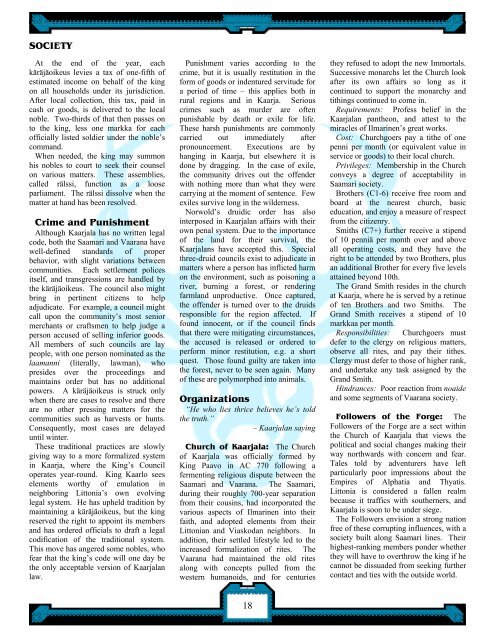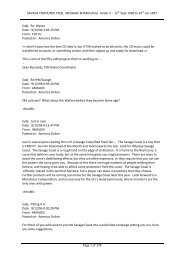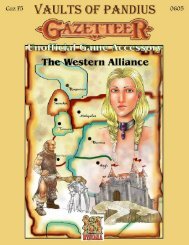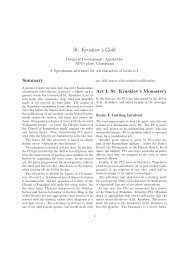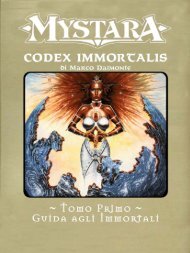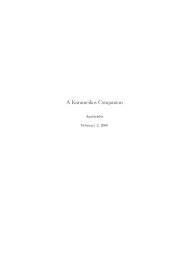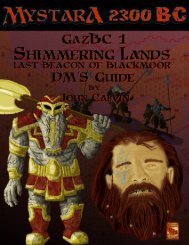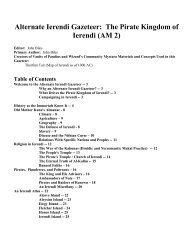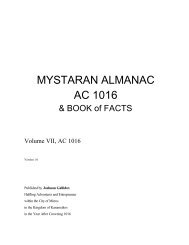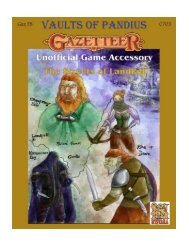Gaz F10 The Kingdom of Kaarjala - Vaults of Pandius
Gaz F10 The Kingdom of Kaarjala - Vaults of Pandius
Gaz F10 The Kingdom of Kaarjala - Vaults of Pandius
You also want an ePaper? Increase the reach of your titles
YUMPU automatically turns print PDFs into web optimized ePapers that Google loves.
SOCIETYAt the end <strong>of</strong> the year, eachkäräjäoikeus levies a tax <strong>of</strong> one-fifth <strong>of</strong>estimated income on behalf <strong>of</strong> the kingon all households under its jurisdiction.After local collection, this tax, paid incash or goods, is delivered to the localnoble. Two-thirds <strong>of</strong> that then passes onto the king, less one markka for each<strong>of</strong>ficially listed soldier under the noble’scommand.When needed, the king may summonhis nobles to court to seek their counselon various matters. <strong>The</strong>se assemblies,called rälssi, function as a looseparliament. <strong>The</strong> rälssi dissolve when thematter at hand has been resolved.Crime and PunishmentAlthough <strong>Kaarjala</strong> has no written legalcode, both the Saamari and Vaarana havewell-defined standards <strong>of</strong> properbehavior, with slight variations betweencommunities. Each settlement policesitself, and transgressions are handled bythe käräjäoikeus. <strong>The</strong> council also mightbring in pertinent citizens to helpadjudicate. For example, a council mightcall upon the community’s most seniormerchants or craftsmen to help judge aperson accused <strong>of</strong> selling inferior goods.All members <strong>of</strong> such councils are laypeople, with one person nominated as thelaamanni (literally, lawman), whopresides over the proceedings andmaintains order but has no additionalpowers. A käräjäoikeus is struck onlywhen there are cases to resolve and thereare no other pressing matters for thecommunities such as harvests or hunts.Consequently, most cases are delayeduntil winter.<strong>The</strong>se traditional practices are slowlygiving way to a more formalized systemin Kaarja, where the King’s Counciloperates year-round. King Kaarlo seeselements worthy <strong>of</strong> emulation inneighboring Littonia’s own evolvinglegal system. He has upheld tradition bymaintaining a käräjäoikeus, but the kingreserved the right to appoint its membersand has ordered <strong>of</strong>ficials to draft a legalcodification <strong>of</strong> the traditional system.This move has angered some nobles, wh<strong>of</strong>ear that the king’s code will one day bethe only acceptable version <strong>of</strong> <strong>Kaarjala</strong>nlaw.Punishment varies according to thecrime, but it is usually restitution in theform <strong>of</strong> goods or indentured servitude fora period <strong>of</strong> time – this applies both inrural regions and in Kaarja. Seriouscrimes such as murder are <strong>of</strong>tenpunishable by death or exile for life.<strong>The</strong>se harsh punishments are commonlycarried out immediately afterpronouncement. Executions are byhanging in Kaarja, but elsewhere it isdone by dragging. In the case <strong>of</strong> exile,the community drives out the <strong>of</strong>fenderwith nothing more than what they werecarrying at the moment <strong>of</strong> sentence. Fewexiles survive long in the wilderness.Norwold’s druidic order has alsointerposed in <strong>Kaarjala</strong>n affairs with theirown penal system. Due to the importance<strong>of</strong> the land for their survival, the<strong>Kaarjala</strong>ns have accepted this. Specialthree-druid councils exist to adjudicate inmatters where a person has inflicted harmon the environment, such as poisoning ariver, burning a forest, or renderingfarmland unproductive. Once captured,the <strong>of</strong>fender is turned over to the druidsresponsible for the region affected. Iffound innocent, or if the council findsthat there were mitigating circumstances,the accused is released or ordered toperform minor restitution, e.g. a shortquest. Those found guilty are taken intothe forest, never to be seen again. Many<strong>of</strong> these are polymorphed into animals.Organizations“He who lies thrice believes he’s toldthe truth.”– <strong>Kaarjala</strong>n sayingChurch <strong>of</strong> <strong>Kaarjala</strong>: <strong>The</strong> Church<strong>of</strong> <strong>Kaarjala</strong> was <strong>of</strong>ficially formed byKing Paavo in AC 770 following afermenting religious dispute between theSaamari and Vaarana. <strong>The</strong> Saamari,during their roughly 700-year separationfrom their cousins, had incorporated thevarious aspects <strong>of</strong> Ilmarinen into theirfaith, and adopted elements from theirLittonian and Viaskodan neighbors. Inaddition, their settled lifestyle led to theincreased formalization <strong>of</strong> rites. <strong>The</strong>Vaarana had maintained the old ritesalong with concepts pulled from thewestern humanoids, and for centuriesthey refused to adopt the new Immortals.Successive monarchs let the Church lookafter its own affairs so long as itcontinued to support the monarchy andtithings continued to come in.Requirements: Pr<strong>of</strong>ess belief in the<strong>Kaarjala</strong>n pantheon, and attest to themiracles <strong>of</strong> Ilmarinen’s great works.Cost: Churchgoers pay a tithe <strong>of</strong> onepenni per month (or equivalent value inservice or goods) to their local church.Privileges: Membership in the Churchconveys a degree <strong>of</strong> acceptability inSaamari society.Brothers (C1-6) receive free room andboard at the nearest church, basiceducation, and enjoy a measure <strong>of</strong> respectfrom the citizenry.Smiths (C7+) further receive a stipend<strong>of</strong> 10 penniä per month over and aboveall operating costs, and they have theright to be attended by two Brothers, plusan additional Brother for every five levelsattained beyond 10th.<strong>The</strong> Grand Smith resides in the churchat Kaarja, where he is served by a retinue<strong>of</strong> ten Brothers and two Smiths. <strong>The</strong>Grand Smith receives a stipend <strong>of</strong> 10markkaa per month.Responsibilities: Churchgoers mustdefer to the clergy on religious matters,observe all rites, and pay their tithes.Clergy must defer to those <strong>of</strong> higher rank,and undertake any task assigned by theGrand Smith.Hindrances: Poor reaction from noaideand some segments <strong>of</strong> Vaarana society.Followers <strong>of</strong> the Forge: <strong>The</strong>Followers <strong>of</strong> the Forge are a sect withinthe Church <strong>of</strong> <strong>Kaarjala</strong> that views thepolitical and social changes making theirway northwards with concern and fear.Tales told by adventurers have leftparticularly poor impressions about theEmpires <strong>of</strong> Alphatia and Thyatis.Littonia is considered a fallen realmbecause it traffics with southerners, and<strong>Kaarjala</strong> is soon to be under siege.<strong>The</strong> Followers envision a strong nationfree <strong>of</strong> these corrupting influences, with asociety built along Saamari lines. <strong>The</strong>irhighest-ranking members ponder whetherthey will have to overthrow the king if hecannot be dissuaded from seeking furthercontact and ties with the outside world.18


